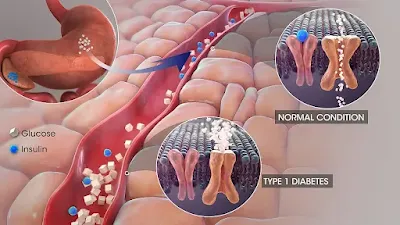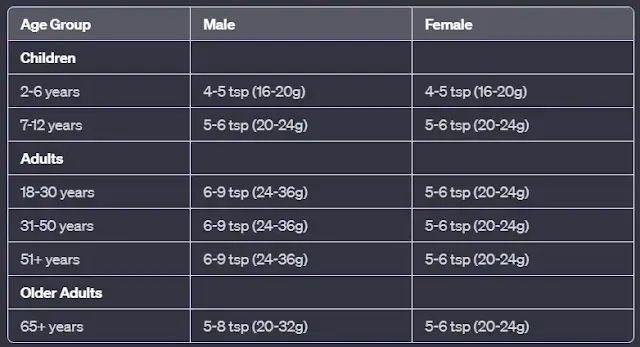INTRODUCTION
.webp) |
| Sugar |
- Type 2 Diabetes.
- Increasing Obesity.
- Non-Alcoholic Fatty Liver Disease (NAFLD).
- Research also show that mindless consumption of sugar can be one of the root causes for cancer.
So, in this blog, I have decided to make people aware of Sugar, its usage in our day to day lives and many more.
WHAT
IS SUGAR ?
Sugars are categorized as polyhydroxy aldehydes/ketones and are part of the glycans/carbohydrate group. These compounds serve as the energy currency, facilitating essential bodily functions such as the production of Adenosine triphosphate (ATP). Carbohydrates, a vital class of macronutrients(macronutrients are nutrients that our body needs in large amount. For example, proteins, carbohydrates, fats, etc.) present in various foods and beverages, play a crucial role in supplying energy to the body for its regular functioning and physical activities, utilizing glucose as a primary source.
 |
| Structure of Glucose |
But despite the numerous applications
of sugar, the ongoing debate regarding whether sugar is a friend or enemy remains
unresolved. While certain perspectives says that sugar is an enemy, its
complete absence from our diet can significantly impact our health. Therefore,
this article aims to shed light on the impact of sugar intake, examining both
its benefits and possible harm damages on human health.
HOW IS SUGAR MADE FROM SUGARCANE ?
First of all, we will begin our story
by knowing how sugar is obtained from sugarcane. The process of making sugar
from sugarcane is a multi-step procedure that transforms the raw plant material
into refined sugar and by-products. Initially, mature sugarcane stalks are
harvested and transported to processing facilities. The first initial step is
crushing the sugarcane stalks to extract the sugary juice contained within the
plant's fibres. This raw juice is often impure and dirty and thus, it undergoes
a clarification process, where it is heated and treated with lime to remove
impurities like plant material and soil. The clarified juice is then
concentrated through boiling, resulting in a thick syrup. The syrup undergoes
crystallization, encouraging the formation of sugar crystals. These crystals
are separated from the remaining liquid through centrifugation. The liquid,
known as molasses, still contains some sugar and finds use in various products.
The separated sugar crystals are dried to remove moisture and are then ready
for packaging and distribution. Depending on the desired end product, the raw
sugar may undergo additional refining processes to produce white, refined
sugar. Throughout this process, by-products like molasses play a role in the
production of various industrial and food products, making sugarcane processing
a comprehensive and resourceful industry.
WHY DO NEED SUGAR AND WHY DO WE CONSUME IT ?
So basically, the proper functioning of our body relies on
the intake of sugar. Naturally occurring sugars, such as those found in fruits,
lactose, and milk sugar, contribute a lot to a balanced diet. On the contrary,
"added sugars," which are incorporated during the processing of food,
beverages, and other preparations, can be harmful to our health . In contrast,
"essential sugars" refer to carbohydrates necessary for the body to
absorb nutrients from its sources. Primarily recognized as glyconutrients, these nutrients are
derived from fruits and vegetables. The consumption of sugars from fruits is
not harmful because, in addition to fructose, they also contain fibres and
various nutrients. Fructose provides quick energy to the body, while fibres
mitigate its effects, ensuring sustained energy. Similarly, sugars in dairy
foods offer benefits by providing additional nutrients. Certain complex
carbohydrates, such as whole grains and starchy vegetables, also contain
healthy sugars and nutrient-rich fibres.
In short, sugars are the carbohydrates, the fuel for our body to work. Without them, our machine(body) won’t work and that’s why we need them. There are two types of sugar :
- Added Sugars - The one in packed foods [BAD for health]
- Essential Sugar – The one in fruits and vegetables [GOOD for health]
Also, there are many types of sugar, here are some them that we consume (Of course, I will not be going in details and just be telling you their names):
 |
| Types of sugar that humans consume |
IS
EXCESSIVE CONSUMPTION OF SUGAR LINKED WITH DIABETES ?
 |
| Diabetes (credits to - Wikipedia) |
1. Type 1 Diabetes:
·
Cause: In this type, the immune system mistakenly attacks and
destroys the insulin-producing beta cells in the pancreas.
·
Onset: Typically diagnosed in children and young adults.
·
Treatment: Requires insulin injections or an insulin pump to manage
blood sugar levels.
2. Type 2 Diabetes:
·
Cause: This type results from a combination of insulin resistance
(where cells do not respond effectively to insulin) and a relative insulin
deficiency.
·
Onset: Often diagnosed in adulthood, but it can occur in children
and adolescents as well.
·
Treatment: Managed through lifestyle changes, oral medications, and
sometimes insulin.
Now, what is the relation of sugar with Diabetes? Or can eating sugar lead to Diabetes? Well, many researches says that sugar directly or indirectly associated with every problem of human body (And of course, one of it being - Diabetes) while these studies do not prove the strong link of table sugar with diabetes.
Now, what is the relation of sugar with
Diabetes? Or can eating sugar lead to Diabetes? Well, many researches says that sugar directly or
indirectly associated with every problem of human body (And of course, one of
it being - Diabetes) while these studies do not prove the strong link of table sugar with diabetes.
RELATION OF SUGAR WITH AGING
Now, another interesting sub-topic to discuss is about the relation of sugar with aging of human skin. Many experts says that sugars have an interesting correlation with deterioration of human skin. One of them was Dr. Nish from UnityPoint Health who believes that Sugar has the similar effect as that of sugar in that of a banana reacting with protein and causing it to turn brown i.e. the Browning Reaction. Sugar starts a browning reaction from inside our body. He further states that table sugar boosts the reaction almost by seven times.
.webp) |
| What does sugar do to your body ? |
Moreover, here is a table contains the general recommendations for sugar consumption across different age groups and genders that I would like to recommend to you all !
 |
| General recommendations for sugar consumption |
HOW
TO REDUCE SUGAR INTAKE AND CRAVINGS ?
Here are some
tips by me and Dr. Graham Colditz originally given on site bjc.org
(so credits to them):
1. Ensure sugary beverages
are not stocked in your home. By refraining from purchasing them, the
likelihood of consuming such drinks is significantly reduced.
2. Maintain a chilled pitcher
of water or unsweetened tea in the refrigerator. This strategy ensures a
consistently available, healthy option.
3. Opt for unsweetened coffee
over energy drinks. If you seek an energy boost, choose classic black coffee,
which is conveniently available in cans.
4. Prioritize whole fruits
over fruit juices. Whole fruits offer more nutrients and higher fibre content.
If you have a preference for 100-percent juice, consider opting for a
low-sodium, 100-percent vegetable juice. These alternatives tend to provide
various health benefits and usually contain more fibre while having less sugar
than fruit juices, according to Tabak.
5. Exercise moderation with
diet drinks. Despite being low in calories and sugar, there remains much
uncertainty about their potential effects on the body, as noted by Tabak.
6. Invest in a reusable water
bottle. Keep it filled and within reach to reduce the temptation of opting for
sugary drinks when feeling thirsty.
7. One can eat sugary fruits
instead of packaged foods as it will reduce your sugar craving and help in
weight reduction as it will stuff up your appetite.
8. We all know that small
efforts makeup for everything. Small efforts, such as going for healthier drink
choices in meetings or during school activities, can make a meaningful impact
on the well-being of your community.
9. You can also replace sugar
with spice to improve the taste.
10. Instead of taking larger
meals of 3-4 times a day, you can also try to take smaller meals 5-6 times a
day which will keep you full, indirectly reducing your sugar cravings and helps
in giving an efficient weight loss.
